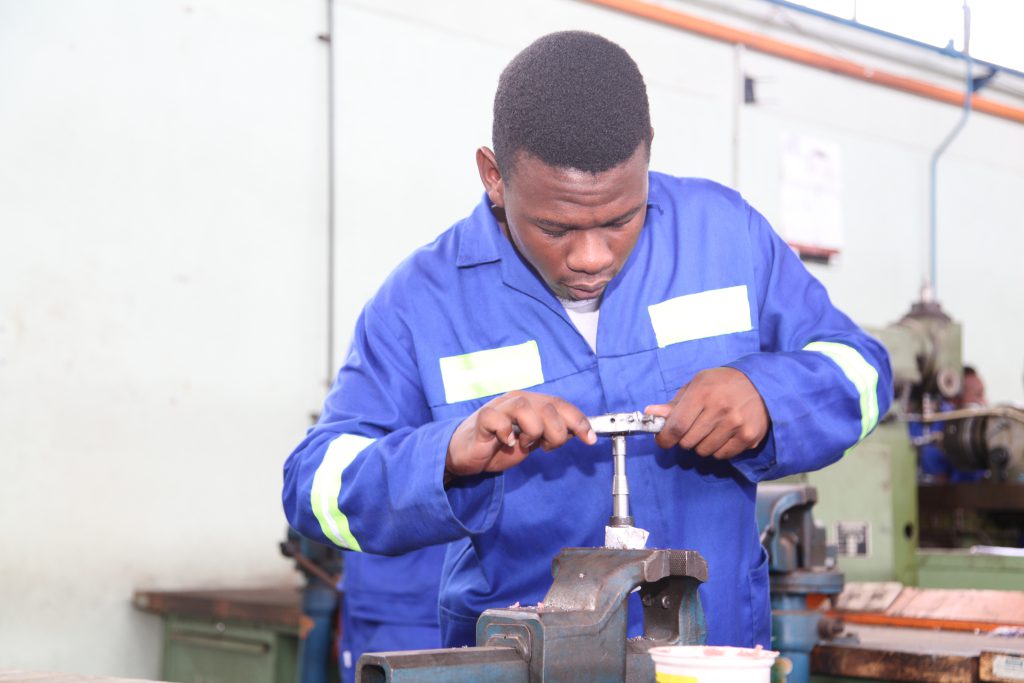Industrial and Manufacturing Engineering - Academic Programmes

The department offers innovative and robust undergraduate and postgraduate degree programs in the following areas:
Bachelor of Technology (Honours) Degree Programme in Industrial & Manufacturing Engineering
The programme is designed to provide a broadly based education in the principle and practice of Industrial and Manufacturing Engineering at Honours Degree level. The primary aim of the programme is to produce graduates of high calibre who possess thorough knowledge of scientific principles and engineering practice and an appreciation of industrial and business environment in which the professional engineer works.
An Industrial and Manufacturing Engineer is capable of improving a company’s overall productivity by designing, installing, operating and maintaining integrated systems of people, equipment, material, information and energy.
Industrial Engineering
The curriculum provides education in each of the basic functional areas of industrial engineering: that is engineering management, ergonomics, systems engineering, and operations research. Students are individually advised and counselled to choose electives to broaden their education and to emphasize subjects of interest.
Courses are available in systems simulation, operations research, industrial management, ergonomics and safety, manufacturing information systems, quality assurance, project evaluation, automated factory concepts, product and process engineering, computer control of manufacturing equipment, advanced manufacturing technologies, robotics and design and analysis of manufacturing systems. The curriculum is augmented by an industrial engineering assembly held once each semester in which engineers from industry are invited to speak about topics of current interest to the profession.
Manufacturing Engineering
Manufacturing engineering is a discipline which focuses on the process of conversion of raw materials to finished products. Graduates of this program have a strong background in the use of computers in integrating phases of a manufacturing enterprise. Manufacturing subjects covered in the curriculum include: computer aided manufacturing, engineering materials, ergonomics, facilities layout and design, industrial simulation, manufacturing processes, manufacturing information systems, product and process engineering, and statistical process control. The program culminates with a team project to design and implement a working manufacturing system to mass-produce a product.
Programme Objectives
After studying a degree in Industrial and Manufacturing Engineering, one will be able to:
- Demonstrate knowledge in quality assurance
- Conduct capacity planning
- Perform systems integration
- Conduct production planning
- Demonstrate knowledge of manufacturing systems and automation
- Formulate mathematical models and solve optimization and operations research problems
- Design computerized management systems
- Design and build simulation models
- Develop databases and information systems
- Perform computer aided manufacturing
- Build mechanical components and systems
- Conduct machine design
Entry Qualifications
Entry requirements for acceptance to this programme are:
- Candidates must comply with Section 3.0 of the General Regulations.
- Advanced level passes in Mathematics and Physics plus any other technical or science subject OR
- ND in Industrial and Manufacturing Engineering or equivalence plus 2years experience OR
- HND in Industrial and Manufacturing Engineering or equivalent
Graduate Competencies
An Industrial and Manufacturing Engineer is capable of:
- Creating and delivering Hi-tech products.
- Designing and implementing an information system
- Designing and using a simulation model
- Designing a manufacturing facility and factory layout
- Designing and implementing a maintenance management system
- Designing and implementing a quality assurance program
- Planning and executing productivity improvement
- Selecting appropriate technologies, processes and equipment
- Evaluating system reliability, availability and maintainability
- Planning and aligning with change and managing innovation for their business ventures
- Preparing a business plan
- Performing economic viability studies
- Implementing and operating a Materials Resource Planning system
- Developing performance measures and standards
- Managing an organisation
- Coordinating the efforts of an engineering team
- Providing management decision support
- Integrating a total system
Graduate Attributes
After completing the Bachelor of Technology Honours Degree in Industrial and Manufacturing Engineering, graduates should possess the following attributes.
- Technopreneurial skills
- Engineering Design Skills
- Engineering Management Skills
- Systems analysis and Decision making skills
- Leadership skills and proactiveness
- Ethics and integrity
Career Prospects
The graduate can start his/her own world class Hi-tech manufacturing enterprise. IME graduates have become a source of talent working in industries such as: Manufacturing, Production, Energy, Automotive, Mines, Logistics, Petrochemical, Hospitals, Banking, Insurance, Food and beverages etc.
The graduate can get employed as a:
- Industrial Engineer
- Plant/ Production Manager
- Manufacturing Manager/Engineer
- Process Engineer/Manager
- Operations Manager/Engineer
- Maintenance Engineer
- Engineering Consultant
- SHEQ Manager
Programme Structure (4 Years)
The programme is a full time course of study to honours degree level and is structured to be delivered over four years. It gives approximately 3700 hours student contact time as described below:
- Each academic year, with the exception of year 3, is divided into two semesters, with each semester being fifteen weeks duration long, including examination time. Year 3 consists a study semester of fifteen weeks duration and an internship of thirty weeks duration (one academic year). Alternatively, students go through an in-house training for 30 weeks (one academic year).
- In year 1, 2 and 4 the academic year normally commences in August and concludes in May. A semester will normally comprise 15 weeks, 12 weeks of which are assigned to teaching, 1 week to revision and 2 weeks to examination.
Master of Technology Degree in Renewable Energy
The MTech degree programme presents the student with the design, innovation, analytical and research techniques hence providing the student henceforth with the skills required to create, develop and manage renewable energy systems.
Programme Objectives
The main objective of this programme is to train engineers and researchers in the area of renewable energy by providing them with core skills and knowledge needed in solving the practical challenges facing the energy industry and the community in general with regard to energy development, provision and utilization through:
- Imparting technopreneurial development skills necessary in the modern industrial environment that include an understanding of principles of economics, legislative and social frameworks within which the engineer operates.
- Imparting research and development competencies necessary for technology transfer, commercialization and research publications.
- Developing a range of competencies in areas that are relevant to renewable energy discipline.
- Equipping students with advanced theoretical concepts, research and practical skills in renewable energy technologies, thus enhancing their ability to solve complex engineering problems.
Master of Technology Degree in Engineering Design
The MTech programme presents the student with the design, innovation, analytical and research techniques hence providing the student with the skills required to develop, and commercialise engineering designs. The master’s degree programme in Engineering Design offers specializations in Industrial and Machine Design Technologies. The programme aims to provide in-depth knowledge in design related areas such as geometric modelling, mechanics, tool design and design analysis.
Programme Objectives
- To impart technopreneurial development skills necessary in the modern industrial environment that include an understanding of principles of economics, legislative and social frameworks within which the engineer operates.
- To impart research and development competencies necessary for technology transfer, commercialization and research publications.
- To develop a range of competencies in areas that are relevant to the Engineering Design discipline.
- To apply emerging trends in Engineering Design that facilitates socio-economic transformation.

